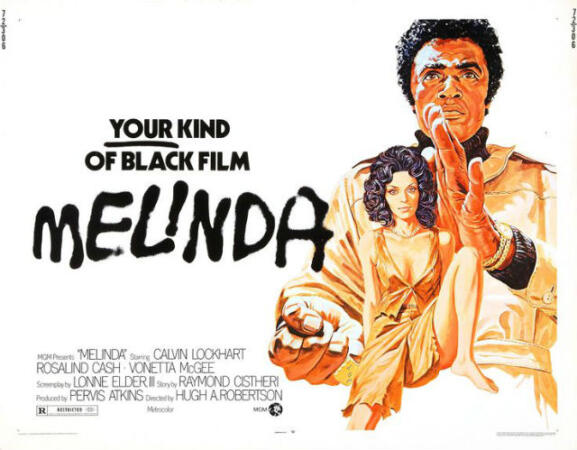 Well “Melinda” may not exactly your kind of back film, but it sure is mine. Released during the summer of 1972, the film has gained something of a cult following over the past few years. And it is, without question, one of best films released during the whole blaxploitation era, in the early to mid 70’s. And it is a different sort of film.
Well “Melinda” may not exactly your kind of back film, but it sure is mine. Released during the summer of 1972, the film has gained something of a cult following over the past few years. And it is, without question, one of best films released during the whole blaxploitation era, in the early to mid 70’s. And it is a different sort of film.
Not an action film per se – until the last 10 minutes or so – the film is rather a deliberately paced, methodical murder mystery. It is unique in that it was one of the very few Hollywood studio backed black films of the period which was produced, written and directed by African-American talent: including director Hugh A. Robertson, producer Pervis Atkins, screenwriter Lonnie Elder III and composers Jerry Butler and Jerry Peters.
The film also took a risk with having a totally unlikable lead character, though he does gain some measure of sympathy by the end of the film.
The story centers around Frankie Parker, a very popular morning drive radio DJ played by Calvin Lockhart who happens to also be one of the most insufferably arrogant and self centered persons around. In fact he can’t even pass by a mirror without looking at himself and admiring how handsome he is. And he’s got it all. He’s famous, makes a lot of money, drives a fancy car and has his choice of any woman he wants. And by the way, did I mention that he’s handsome as well?
There are a few bumps in the road like when he runs into an old girlfriend he dumped, Terry Davis (played by the ever intense Rosalind Cash), who is still upset over how he mistreated her. But Frankie gets unexpectedly knocked off his feet when he meets the very mysterious and gorgeous Melinda Lewis (Vonetta McGee) and he winds up actually falling in love for the first time in his life (the film features one of the most erotic sex scenes ever in an R rated movie). Though the both of them don’t seem to notice that some very scary people are following Melinda everywhere she goes.
Things are great for Frankie until one evening he suddenly finds Melinda brutally beaten and stabbed to death and, of course, he becomes the police’s number one suspect, although they have no evidence to charge him and those scary people who were following Melinda are now following him. So, in order to find out what’s going on and who the real killer is, Frankie has no choice but to turn to (who else?) Terry to help him solve the case. Needless to say, she reluctantly agrees, but is not too thrilled about it and figures she has no choice.
What follows includes a conspiracy, an assassination, a missing tape and I should mention some martial arts action provided by none other than the late great Jim Kelly, who made his film debut in “Melinda,” all leading up to a somewhat ironic twist ending.
Melinda is unique among other blaxplotation films. It’s more adult and intelligent than many of the films of the era; it’s also one of the few pure murder mysteries of the period. It’s also got some stand out sequences (like the aforementioned sex scene), as well as a terrific comic moment where Terry goes to Melinda’s bank with her I.D. and intentionally creates a scene passing herself off as the murder victim to gain access to her safety deposit box It a clever twist, turning the old stereotype of all black people look alike on its head.
The director, Hugh Robertson, started his career as a film editor and was in fact the first black editor ever to be nominated for an Oscar for his work on the film “Midnight Cowboy.” Unfortunately “Melinda” wasn’t the beginning of a great directing career for Robertson. After the film, he directed a few TV episodes before moving to Trinidad for several years, where he made two independent films which were not released in the U.S., before his untimely death at the too young age of 56.
In fact, all three principals in the film, Lockhart Cash and McGee, have passed away as well, since the release of the film, which is a shame because they were wonderful talents who are sorely missed.
Last month, Warner Home Video’s made-to-order DVD speciality label, Warner Archive, finally released a restored new version of “Melinda” in its original aspect ratio, ready to be rediscovered by filmgoers who are looking for something different from the Blaxploitation era.
It’s a gem of a film that should be seen and appreciated. It’s not a classic for the ages, but its an entertaining film that shows audiences that there was a lot more going on during the period.
